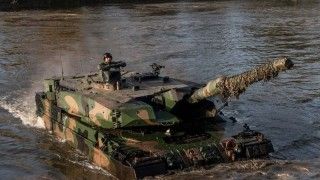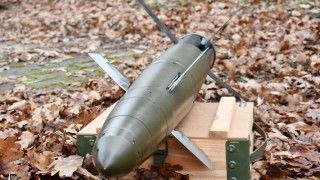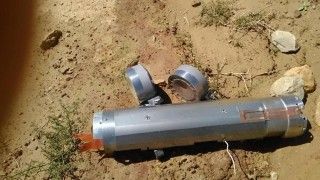- WIADOMOŚCI
East Front News #4: Munitions for Lithuania and Poland, Ukraine-China Peace Agreement, and the Olympic Games
East Front News is a weekly newsletter summarizing the past week’s most important events concerning security and the situation in the Central and Eastern Europe region. It includes original opinions and comments, along with key news items significant from a Polish perspective. If you would like to receive this newsletter, please sign up by clicking

Poland Plans Modern Munitions for Tanks and Howitzers
On Friday, 19 July, The Polish Armament Agency has launched the Initial Market Consultations for two modern munition types that, once procured, could significantly enhance the capabilities of the Polish Armed Forces Artillery and Armored Forces. The first process initiated is regarding the Precision Guided Munitions for the Krab and K9 155 mm howitzers. As usually in case of Initial Market Consultations, the purpose of the process is to obtain information on potential contractors, suppliers, and users, and also knowledge regarding technical, usability, training, and logistics-related aspects. No specifics were provided when it comes to the guidance systems or the warhead of the projectile, and the deadline for submissions is 31 August. On the other hand, another Initial Market Consultations process has been launched to examine the possibilities of procuring programmable 120 mm tank ammunition, integrated with the Leopard 2PL Main Battle Tank Fire Control System. In this case, the submissions are to be sent to the Armament Agency until 16 August.
Lithuania Arms Itself
The Lithuanian Ministry of National Defence confirms an investment of 36 million euros in drones. Importantly, they have decided to choose the regional market, with purchases to be made in the Baltic countries, specifically from Latvian „Edge Autonomy,” Estonian „Threod Systems,” and Lithuanian „Deftools.” The delivery of UAVs will be completed in the fall of this year. This is another step in strengthening Vilnius’s military capabilities, as in response to Russian aggression against Ukraine, a contract was signed with the USA for the delivery of Switchblade 600 drones worth 45 million euros. It is important to note that Lithuania is currently the only country in the region whose air defence forces have an unmanned aerial systems unit. Acquiring UAVs is part of the „Drone Wall” initiative, which aims to protect the external borders of NATO’s eastern flank countries - from Norway to Poland. Strengthening the Lithuanian Armed Forces is very good news for its ally Poland, which is also continuing its own investments. Russian aggression is practically forcing the eastern front to militarize.
Lithuania withdraws from Cluster Munitions Convention and buys drones
The Lithuanian parliament approved a legal act on withdrawal from Cluster Munitions Convention, to which Lithuania had become a party in 2010. Lithuanian authorities have stated that „assessment of feasible threats has changed radically since then, the security environment has deteriorated, military risks to Lithuania has grown, the Russian Federation has become a direct threat to the Republic of Lithuania, all of which requires to revisit provisions of the Convention from the perspective of national security”. In particular, a high military effectiveness of cluster munitions (which has been proven again after US provided some of its stockpiles of Ukraine) was a key argument for Lithuania as well as the fact that most of the NATO countries that have land borders with Russia (expect for Norway and Lithuania itself) have not signed the convention. It is yet to be seen how Lithuania will aim to boost its stockpile of cluster munitions, as the manufacturing of those in US and Western European countries is non-existing or limited due to political reasons. Separately, on 23 July Lithuanian Ministry of Defence announced that it has recently signed three contracts to purchase drones for the Lithuanian Armed Forces, as detailed above. The contracts are valued for EUR 36 million and deliveries are scheduled this fall. The fact that Lithuania invests both in conventional weapon systems (like cluster munitions) and new technologies (like drones) underscores that all those elements need to be seen as complementary and do not replace one another.
Minister Kuleba’s Visit to China
From July 23-26, Ukrainian Foreign Minister Dmytro Kuleba paid an official visit to China. Notably, he was invited by Beijing, renewing diplomatic channels with the People’s Republic of China 29 months after the start of the full-scale Russian aggression. Kuleba will meet with his counterpart, Wang Yi, and conduct „extensive, detailed, and substantive negotiations.” The Ukrainian Foreign Ministry also stated that competition between the peace plans of both sides is undesirable. The meeting is taking place amidst slow progress by the Russian Federation on the front. The current state of the Ukrainian army and the rhetoric of Kyiv and the West highlight the necessity of exploring a peaceful resolution (at least at this moment, as Ukraine might be able to turn the tide after receiving Western systems, additional arms shipments, and F-16 fighters). However, the visions of peace from Kyiv and Beijing are fundamentally different, as confirmed by the Ukrainian peace initiative in Switzerland, which did not involve China. Furthermore, the peace plans of Zelensky and China differ significantly in their provisions. On May 23 of this year, China, together with Brazil, published a „joint proposal for peace negotiations involving Russia and Ukraine”. This proposal essentially favors the Russian Federation, as its provisions address general issues such as the need for a peaceful resolution of the conflict, nuclear safety, and humanitarian support. During a three-hour conversation between Dmytro Kuleba and Wang Yi, the Ukrainian Foreign Minister suggested that Kyiv is ready for peace talks with Moscow but on a different basis than the Chinese proposal. This is extremely important for Poland, as it serves as a buffer for humanitarian and military aid to Ukraine, and any concessions will impact Warsaw’s foreign policy.
Polish Sejm Conclusions after NATO Summit
On July 23, the National Defence Committee met in the Sejm to discuss the NATO Summit in Washington, which took place from July 9-11. The event was summarized by Deputy Minister of National Defence, Paweł Zalewski, and Deputy Minister of Foreign Affairs, Władysław Teofil Bartoszewski. According to Minister Zalewski, the key element of the summit was the demonstration of the Alliance’s unity and the necessity of cooperation to counteract Russian and Belarusian hybrid actions on NATO’s eastern borders. It is worth noting that Poland, along with Germany and Sweden, will be responsible for rotational maritime command of NATO in the Baltic Sea. The operational readiness of the American base in Redzikowo was announced, integrating it into the allied territorial missile defence system. At the same time, NATO committed to providing Kyiv with 40 billion dollars in 2025, with Poland’s contribution amounting to around 630 million dollars. Deputy Minister Paweł Zalewski questioned the need for as many as 500 HIMARS launchers. The last key element is the integration of a multilateral military aid architecture for Ukraine under NATO’s umbrella, with the logistics hub in Rzeszów playing a crucial role.
Security of the Paris Olympics and the Polish Involvement
The Olympic Games, as a mass event, attract interest from hostile terrorist organizations and unfriendly states. Therefore, Paris has been preparing for years to ensure the security of the event in all urban Olympic centers. Securing the Olympics will be the task of about 20,000 soldiers, about 45,000 police officers, and about 22,000 private security personnel. The multidimensional nature of the threats and potential terrorist and hybrid attacks have mobilized all types of armed and police forces (including RAID and GIGN). As a global sports festival, the Olympic Games have prompted 50 countries to support French security efforts. Among the partners is Poland, which has delegated a 20-person task force of soldiers to support infrastructure security and anti-terrorism advisory activities. An additional advantage is the inclusion of dogs to improve the detection of explosives. The opening ceremony of the Olympic Games will have not only a sports dimension but also a political and representative one, as heads of state and government leaders will visit Paris. The Polish delegation will be led by President Andrzej Duda, who received an invitation from Emmanuel Macron. Vladimir Putin will not be present, and the number of athletes from the Russian Federation is small. Paris is currently the world capital of sports, with up to 3 billion people expected to watch the Olympics. This occurs, however, in the shadow of geopolitical contexts marked by conflicts in Ukraine and Gaza, which have rendered the Olympic truce non-existent. In the sports context, Poland is submitting its candidacy to host the Olympics in 2036 or 2044.
East Front News is a weekly newsletter and article on Defence24.com summarizing the past week’s most important events concerning security and the situation in the Central and Eastern Europe region. It includes original opinions and comments, along with key news items significant from a Polish perspective. If you would like to receive this newsletter, please sign up by clicking
Jakub Palowski, Deputy Ed. in Chief & Aleksander Olech, PhD


















